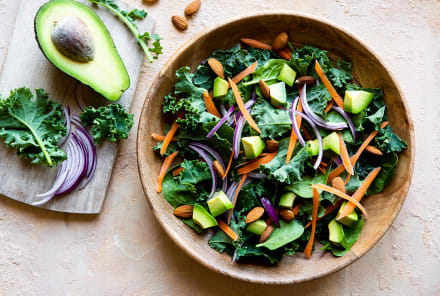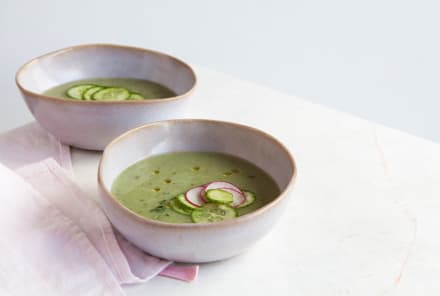Advertisement
15 Innovative, Plant-Based Ways To Substitute Eggs In Cooking & Baking


The versatile egg has become a crucial staple in so many kitchens for good reason. They help bind and leaven baked goods, and they're a classic component of breakfast dishes. If you're 100% plant-based or just don't like eggs, however, those recipes may not seem accessible.
But have no fear, there is truly no shortage of egg substitutes to have in your back pocket. From applesauce to ACV, here are 15 surprising and innovative ways to substitute eggs in the kitchen.
Flax or chia seeds
First up, and one of the more commonly known substitutions, is the flax or chia egg. The process is the same for whichever of the two you choose. Made by simply mixing a tablespoon of flaxseed meal or chia seeds, and 2.5 tablespoons of water, you're left with one "egg" that mimics the texture—and binding ability—of real eggs quite nicely.
These are great for making baked goods like pancakes or cookies. Check out Minimalist Baker's full step-by-step instructions for more detail.
Fruit puree (i.e., applesauce)
This next substitute actually encompasses a few individual options. Puréed fruits like ripe bananas and applesauce are excellent for binding, and they also lend a little extra sweetness, making them ideal for baked goods. For dishes that aren't sweet but still require some binding, like veggie burgers, for example, pumpkin purée would have a similar effect without the sweetness.
To get one egg's worth, measure out about a quarter of a cup. And if you find purées make your baked goods a little fudgier than you usually like, a teaspoon of baking powder for every "egg" will help leaven your dough.
Aquafaba
Aquafaba is a really clever way to get the most out of every can of chickpeas you buy. Technically, it's the liquid found in any canned legumes, but chickpea aquafaba has become the most popular for egg substituting. And the light, whippable texture of aquafaba makes it especially convincing for mimicking the effects of egg whites in recipes.
Three tablespoons of aquafaba whipped is roughly the equivalent of one egg, and any bean flavor will fade away once cooked.
Water, vegetable oil, and baking powder
For a no-fuss, go-to egg replacement, a quick combo of water and oil with some baking powder will do the trick. Just keep in mind that certain recipes would be better served by a less oily substitution, should it require more than a couple of eggs.
All you've gotta do is combine 2 tablespoons of water with 1 tablespoon of vegetable oil and 2 teaspoons of baking powder to get one egg's worth.
Carbonated water
If you've ever heard about all the ways you can use soda in your kitchen, this may not come as a surprise. That's right—you can use soda to replace eggs.
We're recommending straight carbonated water to omit needless sugar and other chemicals, but according to PETA, a can of soda or carbonated water can take the place of two eggs in some boxed mix recipes.
Silken tofu
Silken tofu has more water content than its firmer counterparts, which makes it a good option for baked goods. It does result in a heavier final product than your normal egg would, so keep that in mind and perhaps stick with cookies and breads if you're going to go this route.
A quarter-cup of puréed silken tofu replaces one egg.
Nut butter
If you're a big fan of almond, cashew, or peanut butter, you're going to love this one. Nut butters can absolutely take the place of eggs in certain recipes, and we love them for the protein-packed boost they add. Obviously, this will only work with recipes where a nutty addition makes sense. Think peanut butter cookies, or a cashew butter pancakes—the flavor will definitely be there, so make sure that's what you're planning on.
Three tablespoons of your favorite nut butter is all you'll need to replace one egg. Just make sure it's creamy, not crunchy, to help with binding.
Apple cider vinegar and baking soda
Similar to tofu, apple cider vinegar is another one of those products that seems to do everything. Well, add replacing eggs to the list of ACV uses list, because it can do that, too.
White vinegar will work as well, so whichever you have on hand is fine. Add 1 tablespoon of vinegar to your wet ingredients and 1 teaspoon of baking soda to the dry ingredients to replace one egg. And given the lightness of this option, it's best for fluffier things like cupcakes or muffins.
Yogurt (regular or plant-based)
Yogurt, whether made from milk or plant derivates like coconut or cashew, is another easy way to replace the eggs in your recipe.
All you need is a quarter of a cup per one egg, just like the fruit purées. Best to stick with plain yogurt to mitigate any extra ingredients like sugar or artificial flavors.
Starch
Starches are a great egg replacer, requiring only a little water. Cornstarch, tapioca starch, or potato starch would work, but we like arrowroot powder the most out of these options. They're nice because they're light and won't weigh recipes down in the same way other options might.
And on that note, for extra lift, you can add one-eighth of a teaspoon of baking powder per "egg."
Agar
Agar (also known as agar-agar) is a gelatinous substance derived from red algae, and it's similar to gelatin in that it's excellent for binding in recipes. Unlike gelatin, agar is vegan, but if that aspect is less of a priority for you, gelatin would work too.
One agar "egg" requires an easy-to-remember 1:1 ratio—so, 1 tablespoon of agar per 1 tablespoon of water.
Mashed potatoes or instant mashed potatoes
OK, this next one sounds wild. But according to PETA, instant mashed potato mix can replace eggs in denser baked goods. You only need about 2 tablespoons of the instant powder.
And similarly, if you have leftover mashed potatoes in your fridge, you can use those, too! They provide moisture and a nice, light texture to breads. Just avoid using your garlicky mashed potatoes if you're baking a sweet recipe.
Canned tomato paste
Given that many sweets may be top of mind as you're reading about these substitutes, canned tomato paste might make your nose turn up. But don't worry, we're not suggesting you add tomato paste to your famous Christmas cookies or mom's birthday cake.
You can, however, add it to things like meatloaf, burgers, meatballs, or any other savory dish that requires eggs for binding. Two tablespoons is enough to replace one egg.
Packaged egg replacement powder
And if anyone's hoping for a simple egg-free solution, you're in luck. There are a ton of egg replacement products on the market today, like this one from Bob's Red Mill. If you take a closer look, you'll see it's actually made with potato starch, tapioca flour, and baking soda. (Ring a bell?)
But the prepackaged mix along with instructions makes it super easy to sub out eggs whenever you need to.
JUST Egg
And last but not least, for a product that looks, tastes, and acts like eggs, enter JUST Egg. It can, apparently, be used for baking, but it's also just a great option when you're craving the closest vegan version of scrambled eggs you can get.
Now that you know about all the imaginative, innovative, and groundbreaking ways to work around eggs in your favorite recipes, you'll never have to miss out on a recipe again—and we think that's pretty eggcellent.
Watch Next
Enjoy some of our favorite clips from classes
Enjoy some of our favorite clips from classes
What Is Meditation?
Mindfulness/Spirituality | Light Watkins
Box Breathing
Mindfulness/Spirituality | Gwen Dittmar
What Breathwork Can Address
Mindfulness/Spirituality | Gwen Dittmar
The 8 Limbs of Yoga - What is Asana?
Yoga | Caley Alyssa
Two Standing Postures to Open Up Tight Hips
Yoga | Caley Alyssa
How Plants Can Optimize Athletic Performance
Nutrition | Rich Roll
What to Eat Before a Workout
Nutrition | Rich Roll
How Ayurveda Helps Us Navigate Modern Life
Nutrition | Sahara Rose
Messages About Love & Relationships
Love & Relationships | Esther Perel
Love Languages
Love & Relationships | Esther Perel


















